🎗️Lonny's War Update- October 563, 2023 - April 21, 2025 🎗️
- Yotam Cohen, brother of captive soldier Nimrod Cohen says Prime Minister Benjamin Netanyahu and his allies will see “no quarter for these deeds.”
“We will remember forever. We’ll remind the next generations that at a time of war a government of horrors, haters of Israel, worked to sacrifice citizens and soldiers.”
Referring to Netanyahu’s spokesman Omer Dostri, who said this evening that Israel can’t bring back all the hostages because that would require an end to the war, Cohen says he sees the statement as a “direct admission of the incompetence of the government and its leader.”
“Netanyahu is incompetent and incapable of being the prime minister of Israel,” he says. The terror group, which is still holding 59 hostages, says it will return them in exchange for Israel ending the war and withdrawing from the Strip. Prime Minister Benjamin Netanyahu has repeatedly said he is not willing to end the war until Hamas, which rules Gaza, is completely overthrown. The terror group, which is still holding 59 hostages, says it will return them in exchange for Israel ending the war and withdrawing from the Strip. Prime Minister Benjamin Netanyahu has repeatedly said he is not willing to end the war until Hamas, which rules Gaza, is completely overthrown. Link - Smotrich: We have to say the truth, returning the hostages is not the most important thing
Families of Israelis held hostage by Hamas terrorists in Gaza protest for their release near the Israeli border with Gaza, April 20, 2025. (Erik Marmor/Flash90)Finance Minister Bezalel Smotrich says that bringing the hostages back from Gaza is not the most important goal of the government.
Speaking in an interview on Radio Galey Israel, the far-right minister says: “We have to say the truth, returning the hostages is not the most important thing.
“It is obviously a very important goal, but if you want to destroy Hamas so that there can’t be another October 7th, you need to understand that there can’t be a situation where Hamas remains in Gaza.”
Smotrich slammed for willingness to ‘sacrifice’ hostages
Politicians, mostly from the opposition, slam Finance Minister Bezalel Smotrich for declaring that “returning the hostages is not the most important thing.”
“Smotrich raises the hostages as human sacrifices on the altar of messianic delusions,” declares The Democrats chief Yair Golan, calling Smotrich “the true face of the Netanyahu government — a government in which neglect and the sacrifice of lives is not a failure, but a policy.”
Yisrael Beytenu chairman Avigdor Liberman says that until October 7, Smotrich “claimed that Hamas was an asset,” adding: “One who was wrong then, it’s better to keep quiet now.”
“The return of all hostages is not a matter of debate – it is a moral and national obligation,” Liberman posts on X.
Yesh Atid lawmaker Yorai Lahav Hertzanu declares that he and Smotrich “are not part of the same nation.”
Smotrich’s statement is also condemned by MK Moshe Gafni of the coalition’s United Torah Judaism party, who calls the return of the hostages “the most important issue.” link Smotrich and his evil counterpart, Ben Gvir are both people who should never have been elevated to positions of public office and influence. They are the antipathy of human decency and are beneath contempt. Both of them lack the Jewish and human values of caring for life over death, for living people over dirt, for those suffering over their messianic ideologies. They are an embarrassment to the Knesset and the country and, once again, the person most responsible for the failures that brought us Octobe 7 and the mishandling of the war and the hostages, Netanyahu bears the ultimate responsibility for normalizing the abhorrent actions and words of these two outliers and in doing so, made it 'normal' to express and support their disgusting actions and words.
🎗️Day 563 that 59 of our hostages in Hamas captivity
**There is nothing more important than getting them home! NOTHING!**
“I’ve never met them,But I miss them. I’ve never met them,but I think of them every second. I’ve never met them,but they are my family. BRING THEM HOME NOW!!!”
There is no victory until all of the hostages are home!אין נצחון עד שכל החטופים בבית
Red Alerts - Missile, Rocket, Drone (UAV - unmanned aerial vehicles), and Terror Attacks and Death Announcements
*
- Freed hostage Emily Damari and bereaved father Oren Smadga to light Independence Day torches
Transportation Minister Miri Regev announces the first two Israelis to be granted the honor of lighting a torch during the official state Independence Day ceremony next week.
Oren Smadga, an Olympic medalist whose son, Omer, was killed fighting in Gaza last year, has been selected for the honor.
Oren won a bronze medal in judo at the 1992 Summer Olympics for Israel, and serves currently as head coach of the men’s national judo team. His son, Sgt. First Class (res.) Omer Smadga, 25, was killed in June 2024 in a Hamas mortar attack in the central Gaza Strip.
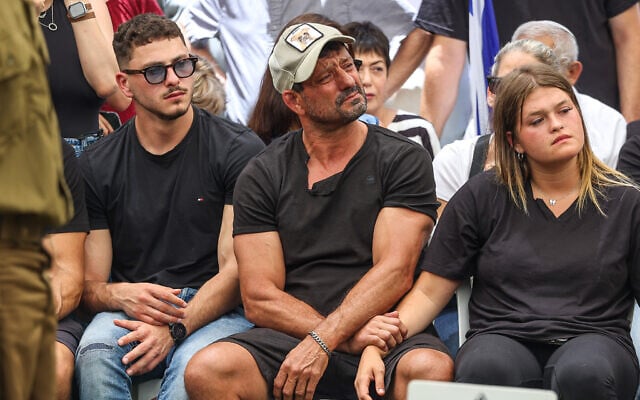 Oren Smadga (center) attends the funeral of his son, Omer Smadga, who was killed fighting in Gaza, in Netanya on June 21, 2024. (Flash90)
Oren Smadga (center) attends the funeral of his son, Omer Smadga, who was killed fighting in Gaza, in Netanya on June 21, 2024. (Flash90)Emily Damari, a freed hostage who was kidnapped from Kibbutz Kfar Aza and returned as part of a ceasefire deal earlier this year, will also light a torch during the ceremony.
An image of Damari holding up her hand, missing two fingers from a gunshot wound she sustained while being kidnapped, quickly became a symbol of Israeli defiance and resilience after she was freed.
The pair are the first of a number of Israelis expected to be selected for the honor.
- ‘Don’t lose hope’: Families of hostages shout across Gaza border to loved ones Elkana Bohbot’s uncle calls Hamas propaganda film of nephew ‘obscene’; Yehuda Cohen, whose son Nimrod is also held in captivity, urges Trump to ‘force Netanyahu to end this bloody war’
Hostage family members gathered on the Gaza border on Sunday morning to symbolically shout through loudspeakers to their loved ones held captive by Hamas in the Strip and demand a deal for their return.
Among those who went to the border, near Kibbutz Nir Oz, was Menashe Harush, uncle of hostage Elkana Bohbot, who was seen Saturday in another propaganda video published by Hamas.
Harush called the video — which showed his gaunt-looking nephew addressing his wife and son in a mock phone call — “obscene.”
The distraught uncle called for the release of all the hostages at once through a deal, rather than in separate stages.
“We don’t have time to wait. They need to get out of there,” Harush said. “We feel the situation is not good. We are worried. Every day there is a dangerous day.”
Yehuda Cohen, the father of 20-year-old hostage Nimrod Cohen, heaped scathing criticism on the government and Prime Minister Benjamin Netanyahu.
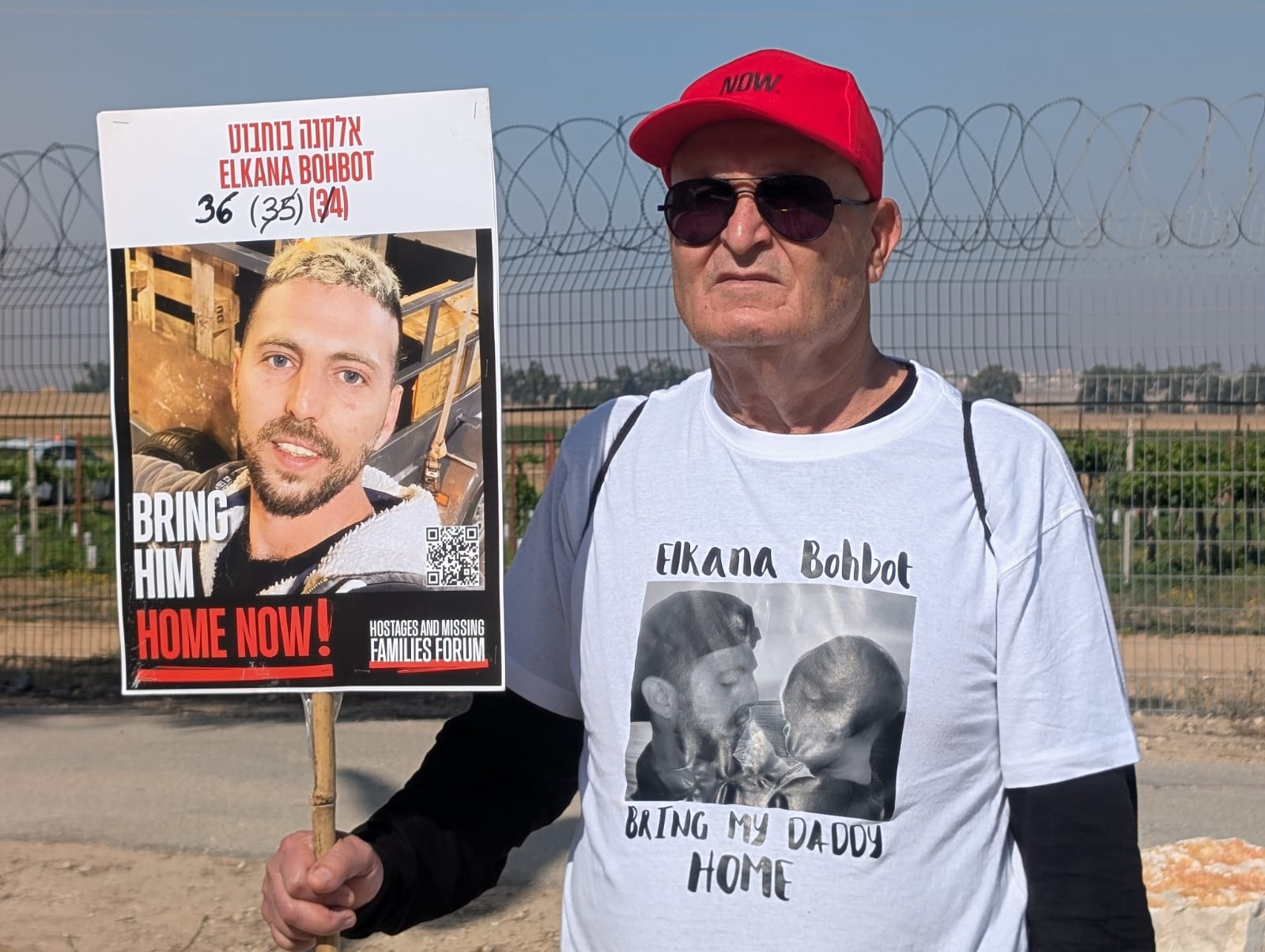 Menashe Harush, the uncle of Hamas hostage Elkana Bohbot, holds a sign depicting his captive loved one while standing near the Gaza border on April 20, 2025. (Tanya Zion-Waldoks)
Menashe Harush, the uncle of Hamas hostage Elkana Bohbot, holds a sign depicting his captive loved one while standing near the Gaza border on April 20, 2025. (Tanya Zion-Waldoks)“We know there’s no chance you’ll hear us 40 meters underground,” said Cohen, addressing his son from the stage. Instead, he said he was speaking directly “to the one who is to blame for you being there,” referring to the premier.
“He [Netanyahu] continues to wage war at the expense of the hostages… of your blood, in order to survive. Netanyahu, resign! You’ve failed, and that’s only putting it mildly,” he continued, declaring that the “one who will save us” is US President Donald Trump.
In English, Cohen called on Trump to “force Netanyahu to end this bloody war… so we can get our loved ones back home.”
Nimrod’s mother Vicky, meanwhile, called out to her son: “Nimrod, my beloved child, this is mama speaking. We miss you terribly. Your room and your friends are waiting for you. Don’t lose hope — we will bring you home.”
Lishay Lavi-Miran, whose husband Omri Miran remains in captivity, spoke about the toll of his absence on their two young daughters.
“Every morning, Roni and Alma wake up and ask, ‘When will daddy come back from Gaza? I don’t have an answer. There are some who may have one, but they are not telling us,” she said.
“We are waiting for you and I promise you that you will hear the word ‘daddy’ again. You will see Roni and Alma running towards you for a hug with me too and not only just in a dream. I know that you are holding on. You are strong, just a little bit longer. Just a little bit longer and you will be here,” she continued.
“Last night, Roni was happy. She woke up in the night and told me, ‘Mom, I felt like daddy was really here. Daddy hugged me,'” said Lavi-Miran of her youngest daughter.
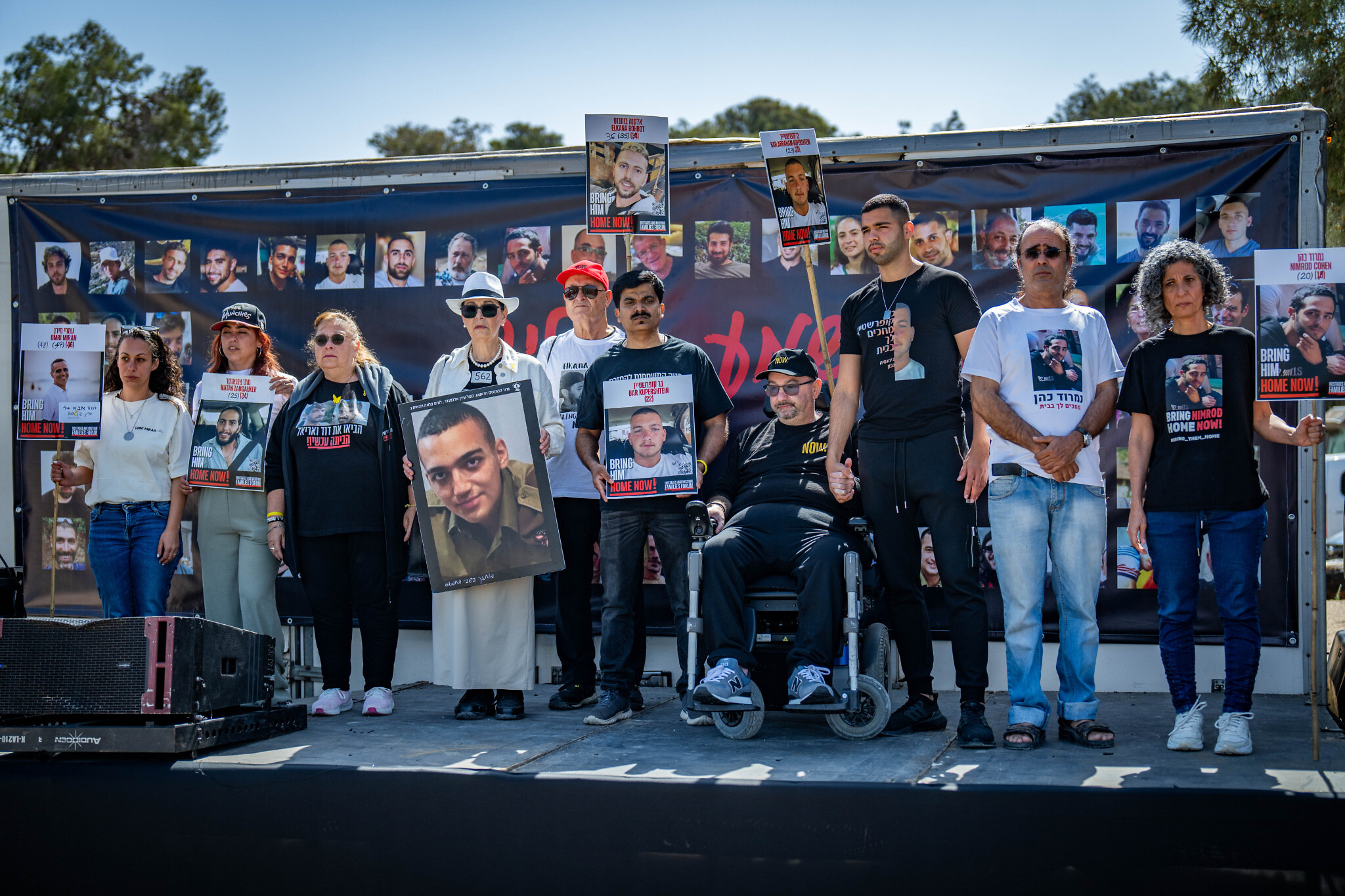 Families of Israelis held hostage by Hamas terrorists in Gaza protest for their release near the Strip’s border, April 20, 2025 (Erik Marmor/Flash90)
Families of Israelis held hostage by Hamas terrorists in Gaza protest for their release near the Strip’s border, April 20, 2025 (Erik Marmor/Flash90)Varda Ben Baruch, the grandmother of captive American-Israeli soldier Edan Alexander, urged an end to Gaza hostilities and said that even though the family received a sign of life from him on the first night of Passover, “nothing is okay.”
“Though I am tired, I am not giving up. A grandma does not give up on her grandson!” she said, urging her grandson to hold on “just a little longer.”
 Varda Ben Baruch, grandmother of Edan Alexander, holds a picture of her son near the border with the Gaza Strip on April 20, 2025. (Lior Rotstein/Hostages and Missing Families Forum)
Varda Ben Baruch, grandmother of Edan Alexander, holds a picture of her son near the border with the Gaza Strip on April 20, 2025. (Lior Rotstein/Hostages and Missing Families Forum)Freed hostage Ilana Gritzewsky, whose boyfriend Matan Zangauker is still in Hamas captivity, shouted to her partner in Hebrew and Arabic, while on the verge of tears.
“I’m tired of waking up to an empty bed, I need you by my side,” she lamented in Hebrew. “My body is here, [but] my soul is with you in the tunnel.”
Continuing in Arabic, she vowed to her partner that he would return home so that the two could “recover together, get married and build a family in our country.”
“Habibi, my beautiful curly-haired one. Don’t lose your light, don’t lose your strength and your smile… I love you, and you are coming back, I promise you,” she said.
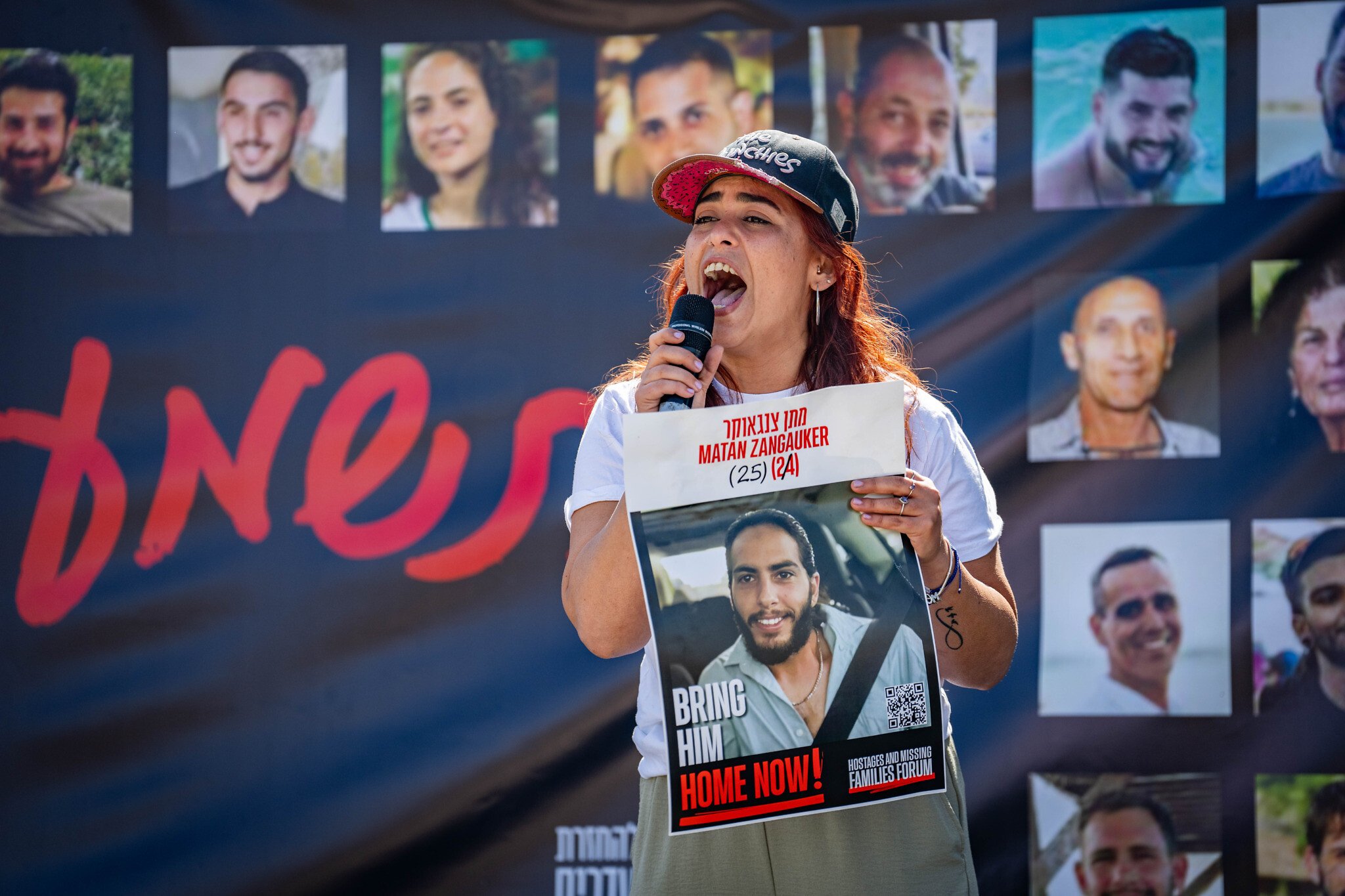 Ilana Gritzewsky shouts to hostage partner Matan Zangauker near the border with Gaza, April 20, 2025 (Erik Marmor/Flash90)
Ilana Gritzewsky shouts to hostage partner Matan Zangauker near the border with Gaza, April 20, 2025 (Erik Marmor/Flash90)Netanyahu’s spokesman Omer Dostri said Saturday that the idea that all the hostages can be returned under a single agreement was “spin.”
“It is impossible to return everyone with one deal. This is a spin. There isn’t anyone who doesn’t want to return our hostages. We are doing everything to return the hostages, and the moment we return everyone, we will eliminate Hamas. It is impossible to do a deal for everyone. Hamas is demanding an end to the war,” Dostri told Channel 12.
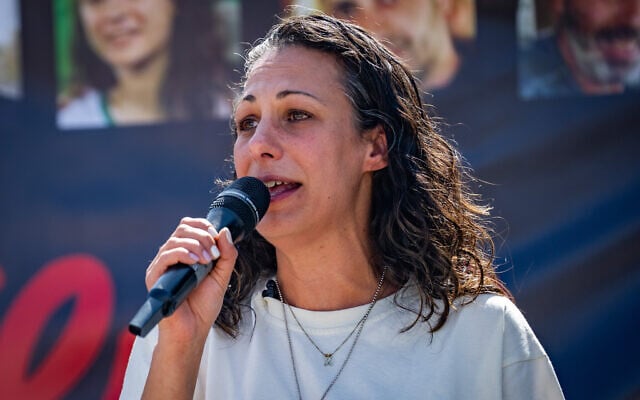 Lishay Lavi-Miran, whose husband Omri Miran is held hostage, shouts to him near the Israeli border with Gaza, April 20, 2025 (Erik Marmor/Flash90)
Lishay Lavi-Miran, whose husband Omri Miran is held hostage, shouts to him near the Israeli border with Gaza, April 20, 2025 (Erik Marmor/Flash90)A short time later, Netanyahu vowed that he would not end the war with Hamas in Gaza until the terror group is removed from power. Critics have argued that additional military operations endanger the remaining hostages and won’t accomplish what Israel was unable to do during the first 15-plus months of the war.
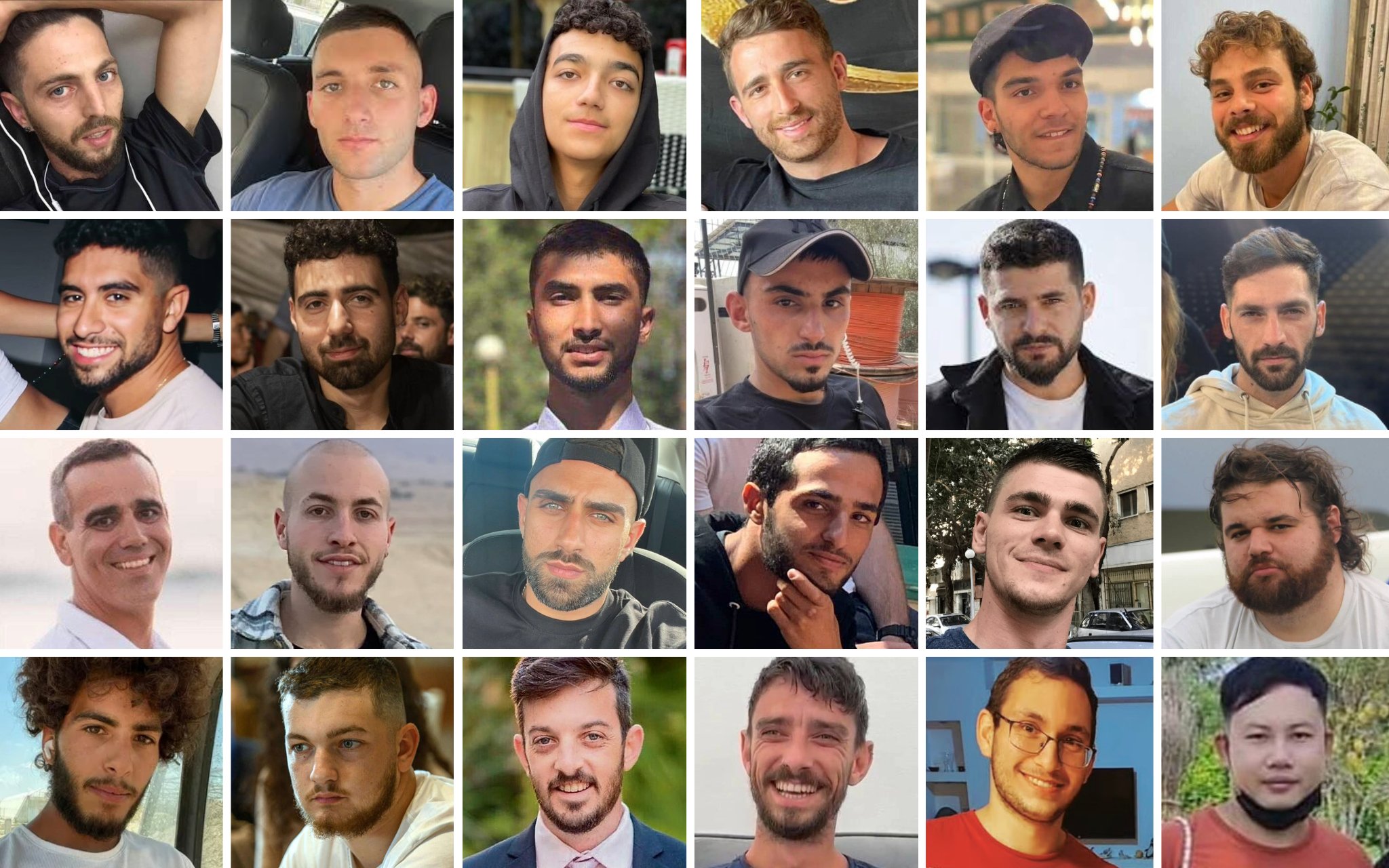 The 24 hostages presumed to be alive who are still held by Hamas: Top row, from left: Elkana Bohbot, Matan Angrest, Edan Alexander, Avinatan Or, Yosef-Haim Ohana, Alon Ohel. Second row, from left: Evyatar David, Guy Gilboa-Dalal, Bipin Joshi, Rom Braslavski, Ziv Berman, Gali Berman. Third row, from left: Omri Miran, Eitan Mor, Segev Kalfon, Nimrod Cohen, Maxim Herkin, Eitan Horn. Bottom row, from left: Matan Zangauker, Bar Kupershtein, David Cunio, Ariel Cunio, Tamir Nimrodi, Pinta Nattapong. (Hostages Families Forum)
The 24 hostages presumed to be alive who are still held by Hamas: Top row, from left: Elkana Bohbot, Matan Angrest, Edan Alexander, Avinatan Or, Yosef-Haim Ohana, Alon Ohel. Second row, from left: Evyatar David, Guy Gilboa-Dalal, Bipin Joshi, Rom Braslavski, Ziv Berman, Gali Berman. Third row, from left: Omri Miran, Eitan Mor, Segev Kalfon, Nimrod Cohen, Maxim Herkin, Eitan Horn. Bottom row, from left: Matan Zangauker, Bar Kupershtein, David Cunio, Ariel Cunio, Tamir Nimrodi, Pinta Nattapong. (Hostages Families Forum)There are 24 hostages who are believed to be alive and were slated for release in the proposed second stage of the ceasefire deal agreed upon in January, which fell apart in March as Israel renewed the fighting in Gaza.
Terror groups in the Gaza Strip still hold a total of 59 hostages, including 58 of the 251 abducted on October 7, 2023. They include the bodies of at least 35 confirmed dead by the IDF.
Negotiations to resume the ceasefire and release the remaining hostages have stalled, with Hamas on Thursday rejecting an Israeli proposal for a temporary ceasefire in the Gaza Strip, reiterating that it opposes any truce deal that does not end the war.
- Hamas says it won’t develop weapons, dig tunnels during long-term truce with IsraelIn nonstarter for Israel, terror group is seeking comprehensive deal under which it would cede control of Gaza’s governance but would stop short of full disarmament
Hamas told Arab mediators last week that it is willing to enter a long-term truce with Israel during which it would halt all military operations, including the development of weapons and the digging of tunnels, two officials familiar with the matter told The Times of Israel on Sunday.
The truce would be part of a comprehensive deal that the terror group is seeking in order to end the Gaza war sparked by its October 7, 2023, onslaught, a senior Palestinian official and a diplomat from an Arab mediating country said.
Hamas is also willing to cede governing control of Gaza to an independent body of Palestinian technocrats, as envisioned by an Egyptian proposal for the postwar administration of the Strip, the officials said.
To enforce the halt on military activities against Israel, some Hamas officials have indicated willingness to have all of the group’s weapons placed in a guarded warehouse, according to the Arab diplomat.
As for the length of the truce, Hamas is willing for it to last five, 10 or even 15 years, the Palestinian official said.
The idea goes further than Hamas has been willing to to go in the past, but still falls well short of the full disarmament that Israel is demanding, and is accordingly a nonstarter.
The comprehensive deal that Hamas negotiators have proposed to Arab mediators would see the return of all remaining Israeli hostages in one batch in exchange for an agreed-upon number of Palestinian prisoners, the officials said.
The deal would also see a permanent ceasefire, the complete withdrawal of Israeli forces from Gaza and the reopening of crossings to allow for the entry of humanitarian aid and the commencement of reconstruction.
Prime Minister Benjamin Netanyahu reiterated his opposition to such a deal on Saturday night, asserting that Israel would not agree to end the war and withdraw from Gaza, even if that meant securing the release of all remaining 59 hostages, as doing so would leave Hamas in power in Gaza — an outcome he would not allow.
Some of his opponents have argued that Israel should prioritize freeing the hostages and deal with Hamas’s dismantlement afterward, but Netanyahu asserted Saturday that this wouldn’t be possible as the terror group is seeking “binding” international commitments that would block Israel from attacking after a comprehensive deal is reached.
In January, Netanyahu agreed to a phased ceasefire deal with Hamas that effectively blocked Israel from resuming the war. The framework secured the release of 33 hostages during a six-week first phase. Toward the beginning of that phase, the sides were supposed to begin negotiations regarding the terms of the second phase, which envisioned a permanent ceasefire and a full withdrawal of Israeli forces from Gaza.
Not wanting to implement those latter two conditions, Israel largely refused to hold negotiations on the second phase, instead seeking to rework the terms of the deal in order to secure another interim ceasefire during which additional hostages would be released without ruling out an IDF return to fighting afterward.
Hamas leader Khalil al-Hayya gives a televised speech rejecting Israel’s offer of a temporary truce and hostage release deal, on April 17, 2025. (Screen capture/X)
While the Trump administration has backed this effort, Hamas has rebuffed all such proposals, leading Israel to resume intensive military operations throughout Gaza on March 18.
Over 1,500 Palestinians have been killed since, according to the Hamas-run Gaza health ministry, whose figures haven’t been verified and don’t differentiate between civilians and combatants.
Hamas has since shifted away from utter rejection of the idea of another interim ceasefire but is still seeking guarantees from the mediators that Israel will hold negotiations on the terms of a permanent ceasefire, which Jerusalem has yet to agree to, the Palestinian official and the Arab diplomat said.
Accordingly, talks have remained at an impasse.
- Former Hamas hostage Eliya Cohen returns to 'shelter of death' for emotional tributeTwo months after his release from Hamas captivity, Eliya Cohen returns to the shelter where he was abducted during the Nova festival attack; in an emotional moment, he prays and pays tribute to the bravery and sacrifices of his companionsTwo months after being released from Hamas captivity, former hostage Eliya Cohen returned on Sunday to the "shelter of death" from which he was abducted in the October 7 attack. In a video posted on his Instagram account, he is seen putting on tefillin and reciting Shema Yisrael.He captioned the video with, "From the very spot where I was abducted, I return and say the same sentence I said moments before my abduction: 'Shema Yisrael.'"Eliya Cohen attended the Nova music festival with his partner Ziv Aaboud, her nephew, the late Amit Ben Avida, and Amit’s partner, the late Karin Schwartzman. When the attack began, the four hid in a shelter that was later dubbed the "shelter of death." Amit and Karin were murdered, and Eliya was abducted. After his abduction, Ziv discovered that Eliya had planned to propose to her and had even purchased a ring.From the same shelter, Omer Shem Tov, who was released from Hamas captivity after 491 days, and Alon Ohel, who is still in Gaza, were also abducted. Hersh Goldberg-Polin was murdered in captivity. In an interview earlier this month, Eliya spoke about the horrific moments in the shelter and the heroism of Aner Shapira, who managed to remove eight grenades that Hamas terrorists had thrown inside. "Out of nowhere, he said, 'We can’t let them kill us like this,'" Eliya shared.Aner Shapira threw another grenade out and continued his efforts, but Eliya recounted: "I saw it with my own eyes—it was clear to everyone what he was doing. At some point, Aner was holding a grenade, and I saw that they managed to shoot him. He fell to the floor, and the grenade exploded with him. At that moment, I thought, 'I can’t believe this—the guy protecting us is gone.'"After Aner fell, others continued throwing grenades out. "I remember a woman picking up a grenade and throwing it—and the last grenade eventually severed Hersh’s hand. After that, no one got up to throw grenades anymore," Eliya said. He described how, at that point, he had to cover himself with bodies: "I saw a body, grabbed it, and covered myself with it, saying to myself, 'At least if grenades explode, this will protect me and Ziv.'"Eliya was released from captivity during the latest hostage deal after being held in Gaza for 505 days. He was released alongside fellow survivors Omer Shem Tov, Omer Wenkert, Tal Shoham, Avera Mengistu and Hisham al-Sayed. link
- IDF ousts officer responsible for incident in which 15 rescue workers were killed in Gaza
The IDF has dismissed the deputy commander of the Golani Brigade’s reconnaissance unit for his responsibility for an incident on March 23 in which his forces opened fire on a convoy of ambulances and emergency vehicles in southern Gaza’s Rafah, killing 15 rescue workers.
The commander is also being removed from his role for his “partial and inaccurate” report of the incident during an initial investigation, the military says.
Additionally, the IDF says the commander of the 14th Reserve Armored Brigade — the unit leading the operation in Rafah when the killing of the medics took place — is being formally censured for his “overall responsibility for the incident,” including the management of the scene afterward.
The moves, decided on by the chief of the Southern Command, Maj. Gen. Yaniv Asor and approved by IDF Chief of Staff Lt. Gen. Eyal Zamir, come following an investigation into the incident led by Maj. Gen. (res.) Yoav Har-Even, head of the General Staff Fact-Finding Assessment Mechanism, an independent military body responsible for investigating unusual incidents during the war.
Har-Even’s investigation found that there were no violations of the IDF’s code of ethics in the incident, but there were several “professional errors” and acts by troops that breached military protocol, alongside a failure to fully report the incident.
The IDF says it “expresses regret for harming uninvolved [civilians],” and says the investigation was intended to prevent such incidents from recurring.
“The existing guidelines on the special caution required with regard to rescue forces and medical workers, even in areas of intense combat, were sharpened and clarified,” the military adds.- Hamas-controlled civil defense agency says 25 killed in airstrikes since dawn
Gaza’s civil defense agency reports that Israeli airstrikes since dawn on Sunday have killed at least 25 people across the Gaza Strip, including women and children.
“Since dawn today, the occupation’s airstrikes have killed 20 people and injured dozens more, including children and women across the Gaza Strip,” Mahmud Bassal, spokesman for the civil defense agency, tells AFP.
In a separate statement later, the agency reports that five people were killed in an Israeli drone strike on a group of civilians in eastern Rafah.
The figures cannot be independently verified and do not differentiate between combatants and civilians.
- IDF says it killed Islamic Jihad terrorist who took part in Oct. 7
The IDF says it eliminated a terrorist who took part in the October 7, 2023, invasion of Israel as part of a series of airstrikes in Gaza.
The terrorist, identified by the IDF as Ahmad Mansour, was a member of the Palestinian Islamic Jihad’s rocket unit and one of the thousands of terrorists who infiltrated southern Israel from Gaza on October 7.
In the last 72 hours, the Israeli Air Force struck over 200 targets throughout the Strip, including terrorist cells, weapon depots, and structures used for terrorist activity, the IDF says.
The IDF does not specify where in Gaza Mansour was killed.
Gaza and the South
- Hezbollah commander killed in Israeli drone strike in south Lebanon, says IDF
A Hezbollah commander was killed in an Israeli drone strike in southern Lebanon’s Kaouthariyet al-Saiyad, located between Sidon and Tyre, earlier today, the IDF says.
The IDF says it targeted Hussein Ali Nasr, the deputy chief of Hezbollah’s Unit 4400, which is responsible for smuggling weapons into Lebanon.
As part of his role, the IDF says Nasr worked, alongside Iran, to smuggle weapons and funds into Lebanon to restore Hezbollah’s military capabilities. Some of the weapons and cash were smuggled via the Beirut airport, the military claims.
“Nasr was in contact with workers at the airport who were secretly operating for Hezbollah and assisting with smuggling operations. In addition, he advanced and led weapons procurement deals with smugglers along the Syria-Lebanon border. Moreover, as part of his role, he oversaw the organization’s force build-up process,” the IDF says.
The military says the strikes come as part of efforts against Hezbollah’s Unit 4400, which is tasked with delivering weapons from Iran and its proxies to Lebanon, via Syria and Iraq.
The strikes against Unit 4400 amid the war have included the assassinations of the head of the unit, Muhammad Ja’far Qassir, in Beirut in early October 2024, and his replacement, Ali Hassan Gharib, in Damascus several weeks later, alongside other top commanders.
- Lebanon’s Aoun says Hezbollah’s disarmament a ‘delicate’ matter key to ‘civil peace’
Lebanese President Joseph Aoun says that disarming the Iran-backed Hezbollah terror group is a “delicate” matter whose implementation required the right circumstances, warning that forcing the issue could lead the country to ruin.
His remarks came as Lebanon’s Health Ministry said two people were killed in Israeli strikes in the country’s south, the latest such raids despite a ceasefire between Israel and the Lebanese terror group.
Restricting the bearing of arms to the state is “a sensitive, delicate issue that is fundamental to preserving civil peace” and requires due “consideration and responsibility,” Aoun tells reporters.
“We will implement” a state monopoly on bearing arms “but we have to wait for the circumstances” to allow this, he says, adding that “nobody is speaking to me about timing or pressure.”
“Any controversial domestic issue in Lebanon can only be approached through conciliatory, nonconfrontational dialogue and communication. If not, we will lead Lebanon to ruin,” he adds.
On Friday, Hezbollah chief Naim Qassem said the group “will not let anyone disarm” it, as Washington presses Beirut to compel the terror group to hand over its weapons.
Qassem said his group was ready for dialogue on a “defense strategy,” “but not under the pressure of occupation” by Israel.
- Palestinian gunman opens fire at troops in West Bank, says IDF
The IDF says a Palestinian gunman opened fire on troops at a checkpoint near the West Bank settlement outpost of Homesh a short while ago.
The troops returned fire, “neutralizing” the attacker, the army says. No soldiers were hurt.
- Warning Letter About the Crisis in the IDF: "Endangering Residents"
In the Foreign Affairs and Defense Committee discussing equal burden-sharing, a sharp warning was issued: a third of the forces in Judea and Samaria are not combat soldiers. The classified discussions reveal a troubling picture—manpower shortages are already leading to unfulfilled missions: "This endangers the residents of Judea and Samaria, as well as those in nearby cities." Meanwhile, the serving public is buckling under the burden, and a fair conscription law seems nowhere in sight.
From the Knesset’s Foreign Affairs and Defense Committee, the law meant to regulate the most contentious issue in Israeli society—IDF conscription—is supposed to emerge. Discussions have been ongoing for months, but without progress, and meanwhile, the crisis on the ground only worsens.
Tehila Elitzur is a lecturer in Talmud and Gemara at seminaries and colleges. Her life changed a year and a half ago when her three sons went off to fight. Her 54-year-old husband, a battalion doctor who has served 340 days since October 7—a full year out of the past year and a half—joined them. She spoke about the severe manpower shortages her husband encounters and the difficult constraints forcing him to draft personnel without proper training.
Tehila is part of a new initiative, "Partnership for Service," representing 4,500 women. They repeatedly come to the Foreign Affairs and Defense Committee to sound the alarm. Alongside her,
Ayelet Hashahar Seidoff, founder of "Mothers on the Front," also attends the committee and describes the crisis on the ground. "My own son is a First Sergeant, but the IDF turned him into an officer—only because he’s capable and smart, and because there are no officers," she told committee members. "At this point, you’re working with an exhausted military."
Rabbi Benny Kelmanson, head of the Otniel Hesder Yeshiva, who lost his son and nephew in the war, also appeared before the committee, supporting Ayelet Hashahar’s words. The Head of the IDF Manpower Directorate, Maj. Gen. Dado Bar-Kalifa, attended one of the sessions and confirmed the testimonies of Tehila, Ayelet Hashahar, and Benny: "We need 6,000-7,000 combat soldiers—believe me."
These testimonies about military shortages are heard repeatedly, even in classified subcommittee discussions. Simultaneously, Knesset members received a written warning from several organizations, including the Religious-National Reservists’ Forum, "Likud Enlists," "Im Tirtzu," and "My Israel."
"From the information we’ve gathered across various field ranks, it appears that as of today, about a third of the forces in Judea and Samaria are not combat troops," the letter stated. "The Judea and Samaria region is divided into six territorial brigades, each with three battalions—yet in each brigade, one battalion is non-combat. These are reservists, men and women, taking on frontline defense missions despite lacking proper training. This endangers them, the residents of Judea and Samaria—and those in nearby cities."
Warning About Declining IDF Readiness in Judea and Samaria
The classified discussions reveal that some operations are already not being carried out due to manpower shortages. The organizations also highlighted this in their warning letter: "There are missions that simply cannot be assigned to these forces, and as a result, they are not being performed at all. Operations—from patrols and village sweeps to arrests, weapons searches, and tracking terror funds—are being postponed due to a lack of capable forces."
But the warnings are not just about what is happening now on the ground—they are mainly about what could happen if this wound, the inequality in burden-sharing, is not healed. Around the discussion table, one can literally see the chasm widening between the ultra-Orthodox public and the religious-national public—a public collapsing under the burden and no longer willing to accept the claim that Torah study exempts one from military service.
It’s not just anger over the current situation and concern for the future. There is also a stinging insult in the implied message from the ultra-Orthodox that there is one Torah worth more—and another worth less. Dr. Chana Katan, a physician and public figure, said: "We want to see our dear ultra-Orthodox community, whose Torah study we respect—but we want them to speak truthfully. The Torah obligates going out to a mandatory war. Those who don’t do this are not upholding the Torah." Hagai Lober, who lost his son Yehonatan in the war, added: "My son studied Torah for four years before enlisting. It’s a big lie to say the world of Torah will suffer. My son—he was the world of Torah."
And where are the ultra-Orthodox Knesset members? Most don’t attend these discussions at all. Usually, one or two MKs are sent to ensure nothing actually progresses. Most of the time, they listen silently, but occasionally, they erupt in frustration over how the political alliance with the religious-Zionist community does not hold up against the blood alliance of those who serve.
The Eli Pre-Military Academy lost 29 alumni in this war; Himmelfarb School lost 10. Rabbi Yerami Stavitsky, the legendary former principal of the school who lost his son-in-law Yinon Fleishman in the war, came to protest what he called an injustice that "cries out to the heavens." "All the cynics who want to sit in yeshiva, avoid the army, and still enjoy all the benefits of the State of Israel—that’s not fair."
No Progress
Not only are there no effective sanctions in these Foreign Affairs and Defense Committee discussions—it also turns out that the ultra-Orthodox receive more than any other citizen:
- Subsidy for after-school care for six children: 400,000 shekels over a lifetime
- Yeshiva stipend: 250,000 shekels
- Discount on National Insurance payments: 30,000 shekels (total over a lifetime: 700,000 shekels)
- A series of low socioeconomic benefits: 300,000-800,000 shekels
Despite the sharp warnings and pleas from those who serve to reprioritize, while the Foreign Affairs and Defense Committee deliberated, the adjacent rooms approved a state budget that once again rewards those who do not serve. From this budget, as MK Merav Cohen revealed—1.3 billion shekels goes to ultra-Orthodox yeshivas. She added that 28 million shekels goes toward preventing ultra orthodox from leaving the Yeshivas and promoting draft evasion. Moreover, 6.2 million shekels goes to ultra-Orthodox liaison organizations with the military—groups that help facilitate draft dodging.
**MK Elazar Stern**, former Head of the IDF Manpower Directorate, addressed the budget: "I’ve said it before: In my eyes, the discussions in the Foreign Affairs and Defense Committee—are worthless. The real conscription law, which is the real draft-dodging law—is the budget law."
The Foreign Affairs and Defense Committee has held 39 sessions and discussions on the conscription law, but the truth is there is no real way to bridge the gaps within the coalition. This absurd situation has even the most dedicated and patriotic fighters on the verge of breaking. They are not just tired from the war, the situation at home, or the collapsing economy—they are tired of the injustice. Ayelet Hashahar Seidoff said: "How is it that two years after we started, and a year after the ruling—not a single ultra-Orthodox man has been drafted? We no longer want to cooperate."
Rabbi Yerami Stavitsky also told the committee: "It’s not like the beginning of the war, when we entered a world of anxieties. Who would let their husband go out? If there are no sanctions, no consequences, if business continues as usual—you will abandon Israel’s security." The bereaved father Hagai Lober added: "We have a lot of strength, but don’t test that strength. Don’t let us fall."
And so, despite the bells ringing loudly again and again, no one is truly acting. Next time, no one will be able to say—"I didn’t know." link
- In court filing, Bar denies Shin Bet withheld Oct. 7 warning from PM, calls accusations ‘incitement’
Shin Bet chief Ronen Bar strongly rejects allegations by Prime Minister Benjamin Netanyahu and others that the agency had advance warning of the October 7 Hamas attack and failed to alert the premier and other security services, and provides precise details of the steps he took during the evening of October 6 and the early hours of October 7.
Writing in a formal statement to the High Court of Justice regarding his dismissal by the government, Bar acknowledges failures by the Shin Bet but says the claims he failed to update the prime minister were part of “institutional incitement” against him and the Shin Bet.
As a prelude, Bar points out that the Shin Bet “strongly warned” the government that the societal divisions that erupted around the coalition’s judicial overhaul agenda in 2023 were being seen by Israel’s enemies as an opportune moment to attack, and that the agency recommended carrying out a series of “targeted attacks” to “prevent the collapse of the balance of deterrence.”
Bar also says he warned Netanyahu in July 2023 of the severity of the security situation and of a “war alert,” which he says was an irregular and unprecedented comment from a Shin Bet chief.
On the night of October 6, Bar says, after receiving “unusual but not unambiguous indications” the commander of the IDF’s Gaza Division and its intelligence unit, and the IDF’s Southern Command, were alerted by telephone of the unusual activity that had been identified at 11 p.m.
At 3:03 a.m. on October 7, all security agencies were issued an alert about “unusual preparations and the possibility of offensive intentions by Hamas,” although he said that the level of this alert was wrong and a represented a failure of the Shin Bet.
Bar says he went to the Shin Bet headquarters at 4:30 a.m., and at 5:15 gave instructions for the prime minister’s military secretary to be updated about the events.
“It is with pain that I emphasize that no one evaluated that an attack like this would erupt and certainly not on that morning,” writes Bar.
“However, the attack was ‘not coordinated by us,’ our teams were not ‘sent in order to save Shin Bet personnel,’ and on that night nothing was ‘hidden from the security establishment or the prime minister,'” insists Bar. LINK
In statement to court on his firing, Bar says Netanyahu required personal loyalty; expected him to obey PM, not High Court, in event of constitutional crisis
Shin Bet chief Ronen Bar tells the High Court of Justice that he was fired not due to professional considerations, but rather due to expectations from Prime Minister Benjamin Netanyahu that he be loyal to the premier and obey him over the High Court, in the event of a constitutional crisis.
In a formal statement to the court relating to petitions against the government’s decision to fire him, the Shin Bet head lists several decisions he made regarding Netanyahu’s affairs that contravened the premier’s expectation of loyalty.
Bar also alleges that “it was made clear to me” that in the event of a constitutional crisis, he must obey the prime minister and not the orders of the Supreme Court.
Those decisions, Bar says, included his authorization of an investigation of the classified documents scandal in the Prime Minister’s Office; his refusal to tell the Jerusalem District Court that Netanyahu couldn’t testify due to security considerations; the Shin Bet’s assertion that the political leadership was in part responsible for the October 7 Hamas attack; the agency’s position that there should be a state commission of inquiry into the catastrophe; and Bar’s authorization of an investigation into the Qatargate scandal.
Bar also asserts that Netanyahu wanted him to use the Shin Bet’s authority to track those involved in anti-government protests and hand over details of protest leaders, but that Bar refused to do so.
He adds that Netanyahu made such requests after formal work meetings had ended and after his military secretary and the stenographer had left the room, in order that they not be recorded. link
- US airstrikes kill 12 people in Yemen’s capital, Houthi rebels say
US airstrikes targeting Yemen’s capital killed 12 people and wounded 30 others, the Houthi rebels say.
The deaths mark the latest in America’s intensified campaign of strikes targeting the rebels. The US military’s Central Command declines to answer questions about the strike or discuss civilian casualties from its campaign.
The Houthis describe the strike as hitting the Farwa neighborhood market in Sanaa’s Shuub district. That area has been targeted before by the Americans.
Footage aired by the Houthis’ al-Masirah satellite news channel shows damage to vehicles and buildings in the area, with screaming onlookers holding what appeared to be a dead child. Others wail on stretchers heading into a hospital
Strikes overnight into Monday also hit other areas of the country, including Yemen’s Amran, Hodeida, Marib and Saada governorates.
The strikes come after US airstrikes hit the Ras Isa fuel port in Yemen last week, killing at least 74 people and wounding 171 others.
The strikes follow the resumption of negotiations in Rome between the US and Iran over Tehran’s rapidly advancing nuclear program, which Washington has linked to its attacks in Yemen. link Whenever there are major American strikes on the Houthis, the question then arises, was this the kind of attack that the Houthis will see as a reason to retaliate against Israel and launch more ballistic missiles our way? If any mid to senior Houthi leaders were killed, if there was massive damage to Houthi infrastructure, if the strike caused potentially damage to their financial assets, then we will experience another attack?
Acronyms and Glossary
ICC - International Criminal Court in the Hague
IJC - International Court of Justice in the Hague
MDA - Magen David Adom - Israel Ambulance Corp
PA - Palestinian Authority - President Mahmud Abbas, aka Abu Mazen
PMO- Prime Minister's Office
UAV - Unmanned Aerial vehicle, Drone. Could be used for surveillance and reconnaissance, or be weaponized with missiles or contain explosives for 'suicide' explosion mission
Join my Whatsapp update group https://chat.whatsapp.com/IQ3OtwE6ydxBeBAxWNziB0
Twitter - @LonnyB58 Bluesky - @lonny-b.bsky.social
Twitter - @LonnyB58





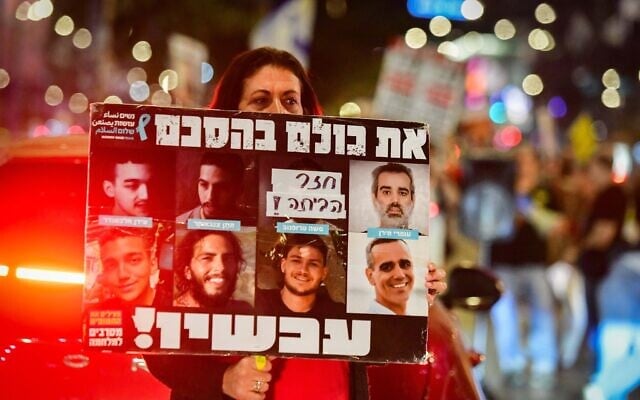
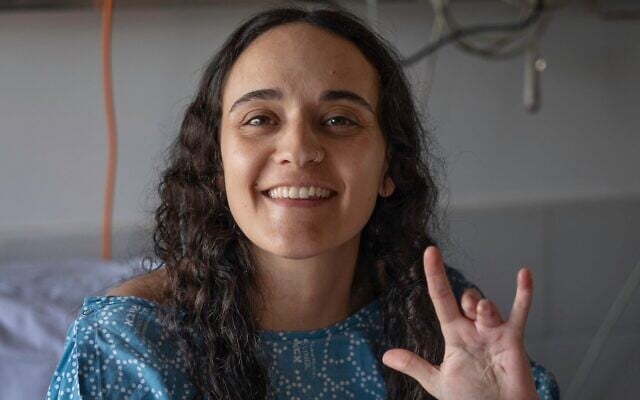




Comments
Post a Comment